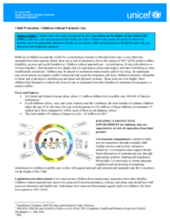Millions of children around the world live in institutions, formal or informal foster care, or are otherwise separated from their parents. Many more are at risk of separation due to the impact of HIV/AIDS, armed conflict, disability, poverty and social breakdown. Children without parental care – in institutions, living with relatives or in foster families - find themselves at a higher risk of exploitation, abuse and neglect, and their well-being is often insufficiently monitored. Children may be placed in institutions unnecessarily and for too long. An inadequate care environment can impair a child’s emotional and social development, and leave children extremely vulnerable to abuse and exploitation, including sexual abuse and physical violence. These risks are even higher when children find themselves without any form of care or separated from their families in situations of emergency or armed conflict.
To meet this challenge, UNICEF emphasizes the importance of building a protective environment for children who are separated or at risk of separation from their parents by ensuring government commitment, facilitating legislation and enforcement, changing attitudes and practices, generating open discussion, ensuring children’s participation, building the capacity of families and communities, and facilitating effective monitoring and reporting.
©UNICEF

